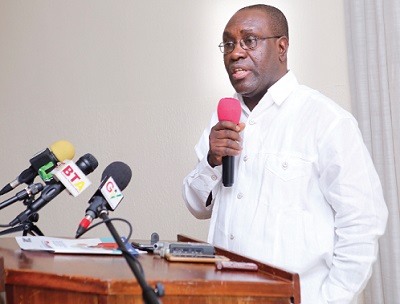
End of SSNIT lump sum - TUC wants govt to soften impact
The Trades Union Congress (TUC) has called on the government to work with workers’ unions to address the challenges that will arrive from next year when the payment of lump sums by the Social Security and National Insurance Trust (SSNIT) ceases.
It said given the generally low salaries and the fact that the second-tier contributions had not been invested over a sufficiently long period of time, pensioners were not likely to receive any substantial lump sum payment, compared to what pertained under SSNIT.
Advertisement
In a statement released last Wednesday as part of its proposals for the 2020 Budget statement, to be presented in Parliament next week, the TUC said: “We urge the government to work with the unions to address these and other challenges.”
The SSNIT has served notice that people who joined before January 1, 2010, will no longer receive lump sum pension benefits from the national pension fund, but must turn their attention to second-tier pension schemes for that from January 2020.
Review NABCO
The TUC also urged the government to review the Nation Builders’ Corps (NABCO) to ensure that the programme contributes to the delivery of quality public service.
It expressed the belief that employment interventions such as NABCO needed to be reviewed to ensure that “they are actually contributing to national productivity.”
The TUC stressed the need for managers of the programme to begin to assess the modules to ascertain those that were making positive impacts or achieving results and re-design those that were not working.
It said for instance that reports of trainees who had not been posted but were being paid allowances must be vigorously investigated and stopped.
“Public support for these initiatives is critical for their success,” the statement said.
Support for SMEs
The TUC also called for support for small and medium enterprises (SMEs), saying the ultimate solution to the jobs crisis lay with the private sector.
“One way to support SMEs is to ensure a reasonable level of lending rates. The private sector in Ghana continues to borrow at over 25 per cent, while their competitors elsewhere are borrowing at less than five per cent.
“The high cost of capital in Ghana is a result of economic policy failure that needs to be addressed to allow the private sector to expand and create jobs.” the statement added.
Housing
It also called on the government to construct affordable houses in cities and urban areas.
“In addition to the construction of affordable housing in cities and urban areas, we propose that workers should be given loans at concessionary rates to construct their own houses,” the statement added.
Tax revenues
In order to increase tax revenues, the TUC called for the elimination of some tax exemptions which it described as “costly, harmful tax exemptions.”
“Tax exemptions (import duty, import VAT, import NHIL and domestic VAT) increased from GH¢391.90 million (0.9 per cent of GDP) in 2010 to GH¢5,269.99 million (2.6 per cent of GDP) in 2017. This is unacceptable in a country which is struggling to meet its revenue target,” the statement indicated.
“The reduction in the benchmark import values, which forms the basis for the assessment of custom duties, fees and levies at the ports, has contributed significantly to the reduction in tax revenues, it further added.
“We cannot allow billions to go down the drain and turn round to impose regressive taxes on innocent Ghanaians, many of whom are struggling to survive.”
Port
The TUC said it expected the government to implement the recommendations of the Inter-ministerial Committee on the Meridian Ports Services (MPS) Concession.
It also called for the re-establishment of the Public Agreements Review Committee (PARC) and building of its capacity to properly review all public agreements, saying ”the parliamentary oversight of public agreements is clearly not enough.”
The TUC expressed the belief that Ghana’s national trade policy “is over-liberalised and inconsistent with the objective of building a strong private sector which is capable of creating quality employment.”
It, therefore, called for a change in trade policy to support domestic businesses and production.



